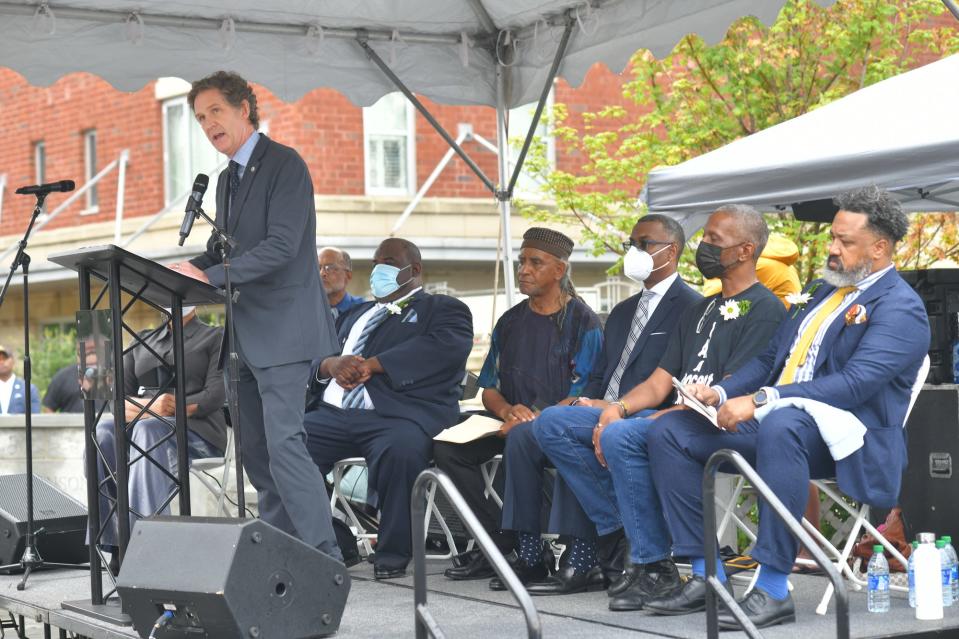Congress should pass law to help America's cities and towns compete against China | Opinion
When I was elected Mayor of Chattanooga, Tennessee, I thought I had a good grip on the kinds of challenges and opportunities I’d be talking about on a regular basis —creating more affordable housing, ending the cycle of generational poverty, ensuring public safety.
These have been the bread and butter issues for America’s mayors for decades, and they still are.
But that portfolio of concerns is beginning to expand dramatically. Strong innovation economies in our cities and towns are essential to creating a path to clean energy independence, securing the integrity of our global supply chains, and ultimately competing with global rivals like China.
Hear more Tennessee Voices: Get the weekly opinion newsletter for insightful and thought provoking columns.
Three things the legislation will do
Not since the Manhattan Project have federal investments in local communities been so vital to our national interest and security.

Right now, Congress is on the cusp of passing the Bipartisan Innovation Act, legislation that would invest in American innovation, address the bottlenecks that are driving inflation, and help ensure our national economy is prepared for foreign competition. This strategy relies on cities and towns across the American Heartland, Sunbelt, and Southeast—cities just like mine.
The most recent versions of the legislation —United States Innovation and Competition Act (USICA) in the Senate and America Creating Opportunities for Manufacturing, Pre-Eminence in Technology, and Economic Strength (COMPETES) Act in the House — do three big things, all critical to our future.
First, they strengthen supply chains and help fight inflation.
Second, they revitalize America’s manufacturing sector.
And third, and perhaps most importantly, they help bring opportunity and innovation to more places across the nation, closing the economic gap between large coastal cities where most wealth in this country is concentrated, and the rest of America.
These are goals that both parties have championed, and it’s another great opportunity for Congress to come together and actually move America forward in the spirit of bipartisanship.
Sign up for Latino Tennessee Voices newsletter: Read compelling stories for and with the Latino community in Tennessee.

Your state. Your stories. Support more reporting like this.
A subscription gives you unlimited access to stories across Tennessee that make a difference in your life and the lives of those around you. Click here to become a subscriber.
NOVONIX is an example of what is possible
And this isn’t just wishful thinking by bureaucrats in Washington. There are already powerful examples of a shift taking place in communities all across the country, examples like the Chattanooga-based company NOVONIX, a critical supplier of synthetic graphite.
Graphite is a critical component of lithium-ion batteries used in electric vehicle production. The vast majority of the world’s natural graphite mines are located in China, a potential supply chain bottleneck that could threaten our path to energy independence as a nation.
But in Chattanooga, NOVONIX is manufacturing graphite from byproducts of oil production—a cleaner and more efficient alternative to mined graphite with far fewer carbon emissions. This means we can create these advanced materials here at home while providing great jobs for our community at the same time.
Jobs like these make a real difference in the lives of residents like Keven Butler, 44, who monitors the furnaces where the graphite is produced. He didn’t know anything about graphite or anode materials until he took a job at NOVONIX, but now he helps oversee the production of some of the most important advanced materials in the world.
Sign up for Black Tennessee Voices newsletter: Read compelling columns by Black writers from across Tennessee.
Diversify America's regional capacity
For our country, this means a more secure supply chain for domestic electric vehicle manufacturing and less reliance on Chinese materials.
For our community, it means hundreds of living wage jobs at a rapidly growing company, positioning our city to lead in the emerging green economy. But for Keven, this work means something closer to home—a good paying job that can support his family at a company that cares about their employees.
"(It's meant) stability," Butler said. "It's meant a different lifestyle.”
Stories like these can be found in communities across the country. Places like Columbus, Ohio, where Intel is investing $20 billion in what is poised to become the largest semiconductor manufacturing location on the planet, supporting over 10,000 American jobs. It’s clear: America still has the ability to compete, but only if our cities and towns are prepared and equipped for the challenge.
That’s why Congress should immediately pass this Bipartisan Innovation Act, which will unlock nearly $10 billion for the U.S. Department of Commerce to designate and invest in over 20 regional technology hubs across the country.
These hubs have the potential to become new centers for innovation and economic development — diversifying America’s regional capacity to produce advanced research, technology, and innovation.
American ingenuity, innovation, and our capacity to lead the world economy is deeply rooted in local communities all across this country—not just a handful of coastal cities. Countries like China have already demonstrated that they are prepared to invest aggressively in their cities. The question before Congress is simple: Will we invest and compete or will we cede the innovation economy to our rivals?
President Biden has said he would sign the legislation. All Congress needs to do is send it to his desk. While this is about jobs and economic growth, it’s also about the security of our country. And our communities and our nation can’t afford to wait—the stakes are far too high.
Tim Kelly is the mayor of Chattanooga.
This article originally appeared on Nashville Tennessean: Chattanooga mayor: Pass law for cities, towns to compete against China

